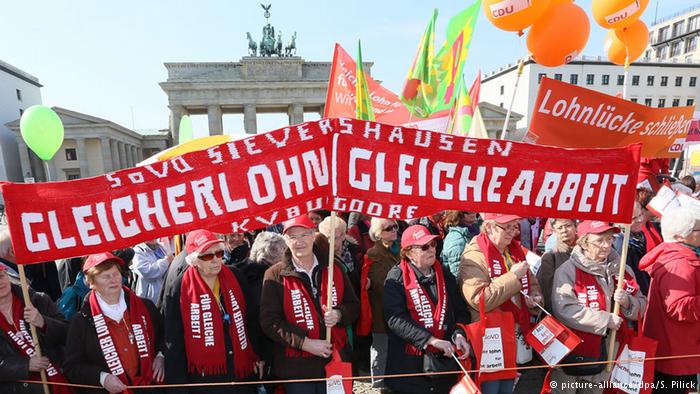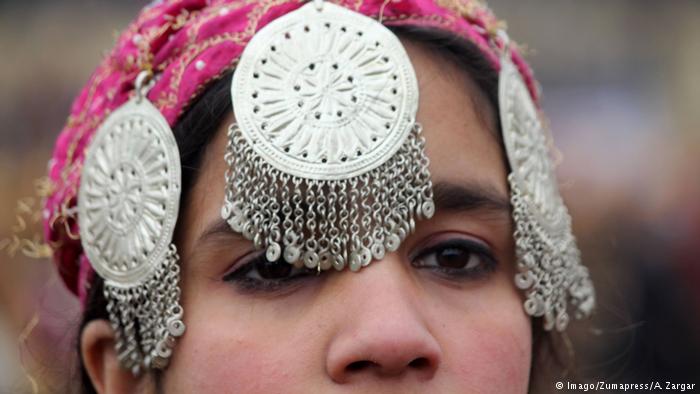Why women in Germany need Equal Pay Day in 2015
Despite legal support and public visibility, women are still paid less than their male colleagues in Germany – and at an alarming rate. On Equal Pay Day 2015, Germans took to the streets in protest.
Germany doesn’t seem to shy away from tackling women’s issues – after all, there’s a healthy amount of parental leave guaranteed by the government, and at an average rate of pay that’s higher than most countries. There’s also a new quota for women in boardrooms to tackle the drastic gender gap in top level management. And equal pay, regardless of gender, is enshrined in Germany’s 1949 Basic Law.
Yet that didn’t stop hundreds of people – many hailing from the federal government, trade unions or women’s groups – from rallying in honor of Equal Pay Day in Berlin on Friday (March, 20th) just one of 1,000 such demonstrations across the country.
“Quotas for female employees, parental leave, and so on… they don’t really affect the current pay gap,” said Wally Kratzenberg-Franke, of Business and Professional Women Germany, the organization behind Equal Pay Day.
While there may be laws on the books to support women in the workplace, they still earn 22 percent less than their male counterparts, she told DW – despite being better educated than ever before. Data released by the European Commission in 2014 also paints a bleak picture: In Europe, Germany ranks third-to-last in gender pay equality, with only Estonia and Austria trailing behind.
Every societal level
Kratzenberg-Franke points to the example of a Birkenstock factory worker who sued the company in 2013 after discovering that her male colleagues, “who did the exact same work as she did,” received one euro more an hour. “It doesn’t seem like a lot, but over a year, it really adds up.”
The employee won, spurring 100 other women to do the same, winning their money back from the Birkenstock company. German magazine Der Spiegel, in a reference to that case, recently asked what the women at the Birkenstock factory have in common with Charlize Theron: Both, of course, are victims of unequal pay for equal work, the latter only discovering as much after hacked emails showed notable pay gaps between male and female Hollywood stars.

Manuela Schwesig at Equal Pay Day 2015
Though the Birkenstock story is inspiring, it happens far too infrequently, Kratzenberg-Franke says – particularly since the pay gap affects not only full-time, contracted employees, but “every social class.”
Her words were echoed Friday by Manuela Schwesig, the Social Democrat (SPD) minister for families and women, who spoke before a crowd gathered in front of Berlin’s Brandenburg Gate.
“When women, despite equal work and education, earn less than their male colleagues, it is not only unfair. It is wrong,” she said.
Professional prejudice
Why, then, does the gap persist? Dr. Julia Graf of IG Metall, Germany’s leading metal workers union – also present at the Berlin rally – says that professions where the majority of workers are women, like nursing and childcare, are very badly paid in Germany, which may also contribute to the pay gap. The fact that many of these jobs remain unfilled – and this in spite of a recent financial crisis and ongoing “population aging”– is a sign to her that the conditions in those fields remain unattractive.
Graf was also quick to dismiss an old excuse – that some “men’s work,” which is better paid, is too physically demanding for women. The issue was revived on Thursday (March 19th, 2015) when a female worker told German radio station Deutschlandfunk that she had been refused a factory job after being told she couldn’t carry as much weight as a man.
“We know a profession like elderly care nursing is a physically demanding job, but done more often by women than men…and of course, it’s a profession that’s badly paid, which is extremely problematic,” she said. Graf also criticized the structures within companies that make it more difficult for a woman to ask for a raise and which give less flexibility to women who want to have families.
Not too late
Despite the government’s involvement being “long overdue,” as Graf put it, both she and Kratzenberg-Franke praised the efforts the government has made so far. Still, both agree there is much to be done. Graf suggests a union-based solution: “It’s very important to have collective bargaining. It’s been shown that at firms with collective bargaining, women earn ten percent more.”
Minister Schwesig plans to present an equal pay bill to parliament this year and has demanded that women receive the same remuneration as their male colleagues. But the SPD’s coalition partners the Christian Democrats (CDU) have distanced themselves from her position in the media.
Author: Elizabeth Schumacher
WTO RECOMMENDS
Gender Equality in the Fight against violence
Do you know Bill Cosby? Have you heard that Bill Cosby is alleged to have sexually assaulted a number of women? This kind of news spreads very quickly mostly because he is a celebrity. Do you know Denis Mukwege? If you don’t, you ought to.
Opinion: Still a long way to go for women in Germany
Despite being better educated, women in the region face a host of key issues such as employment discrimination, gender pay gap and a deeply entrenched cultural bias against working women, says MasterCard’s Georgette Tan.
Fight for Women’s Rights Everywhere
I was involved in a discussion started by a friend of mine a couple of days ago. In his opinion, “women’s rights are hardly an issue in most developed western countries in comparison to 100 years ago.” So he thinks that “what liberated woman and supportive men of These western countries need to do is go to a country that really does have woman impediments, and make a difference for them.”









